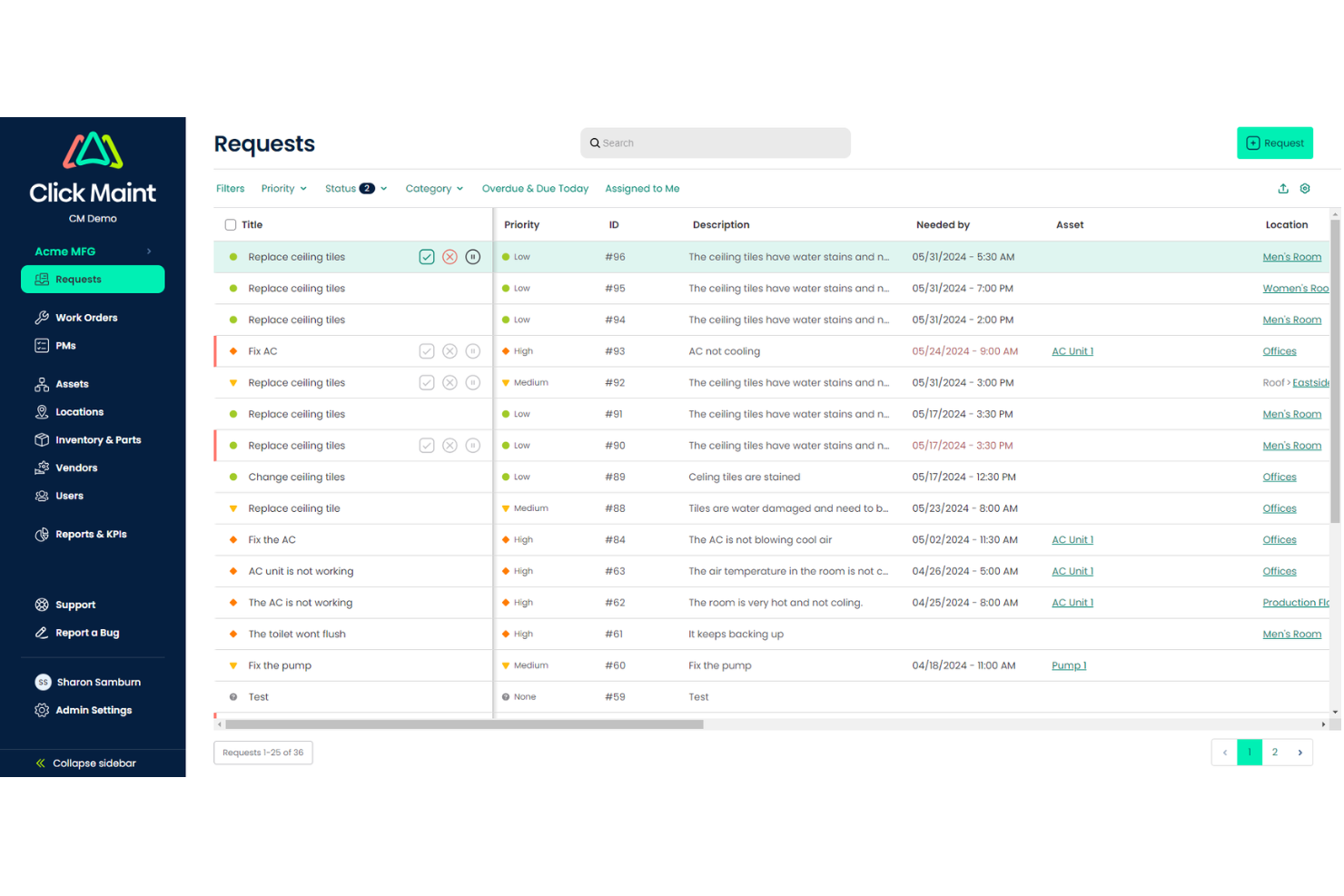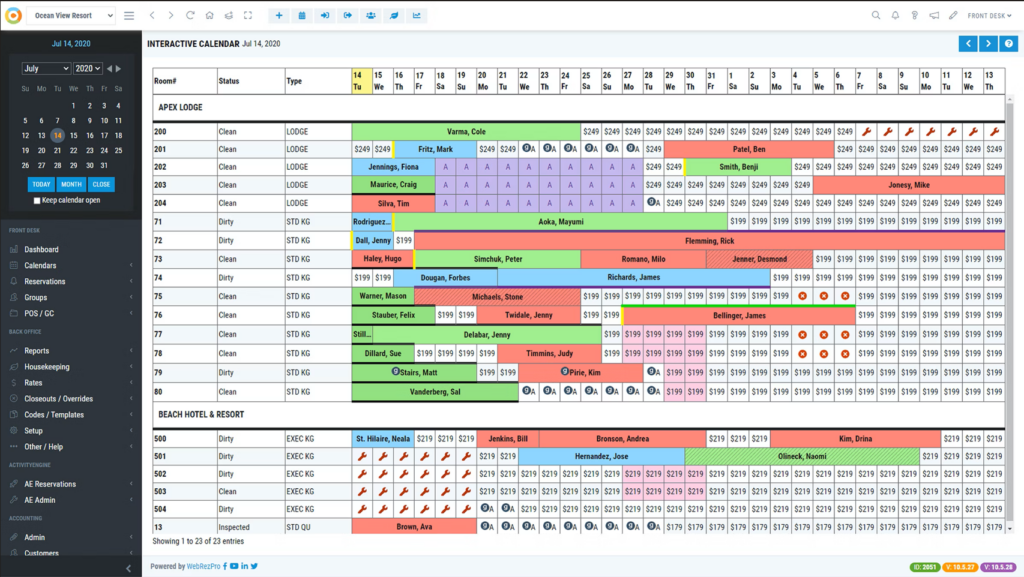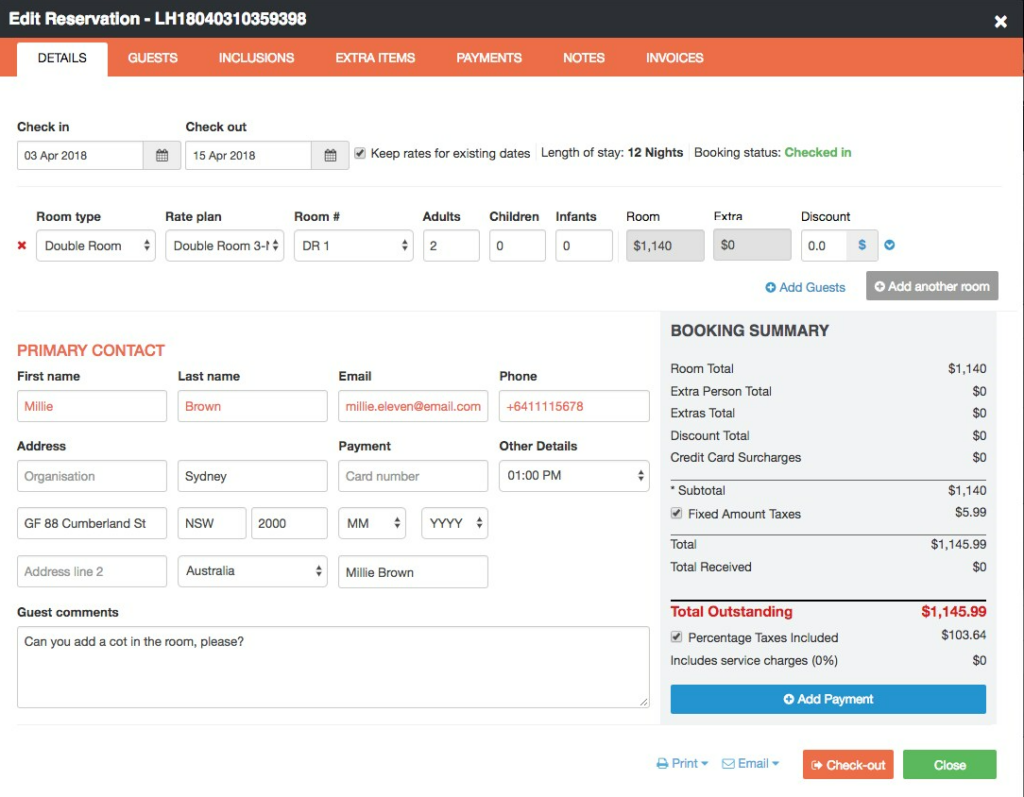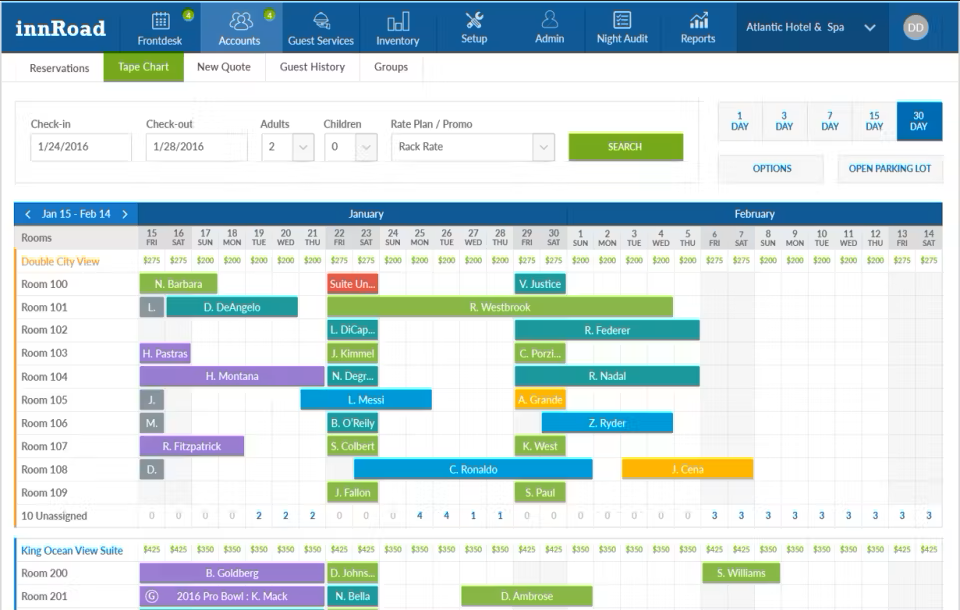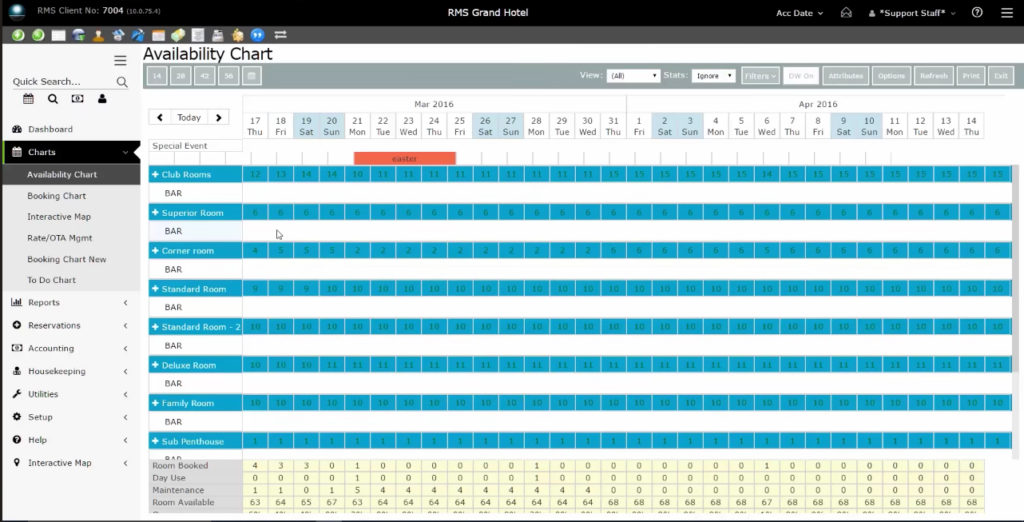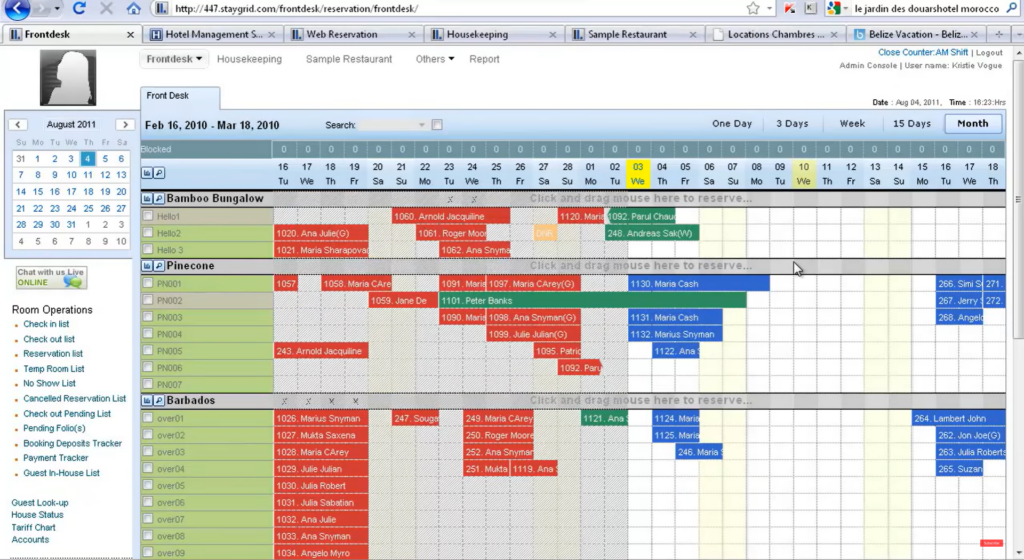10 Best Hotel Management Software Shortlist
Here's my pick of the 10 best software from the 30 tools reviewed.
Get free help from our project management software advisors to find your match.
A hotel management system (HMS) is software designed to streamline and automate the day-to-day operations of a hotel, including reservations, billing, housekeeping, and guest management.
With my industry expertise to guide me, I surveyed 50+ hotel management software and made my top 10 recommendations for hoteliers from there. In this article, you'll find product reviews and rankings, key feature lists, and pricing comparisons.
Why Trust Our Software Reviews
We’ve been testing and reviewing hotel management software since 2023. We’ve tested more than 2,000 tools for different hotel management use cases and written over 1,000 comprehensive software reviews. Learn how we stay transparent & check out our software review methodology.
Best Hotel Management Software Summary
| Tool | Best For | Trial Info | Price | ||
|---|---|---|---|---|---|
| 1 | Best for hotel maintenance | 30-day free trial | From $35/user/month (billed annually) | Website | |
| 2 | Best for hotel revenue optimization | Free demo available | Pricing upon request | Website | |
| 3 | Best for internal hotel communication | 14-day free trial + free plan available | From $29/month (for up to 30 users, billed annually) + $0.5/user/month for each additional user | Website | |
| 4 | Best for integrating with third-party applications | Not available | From $5/user/month, (billed annually). | Website | |
| 5 | Best for small hotels and bed & breakfast establishments | 30-day free trial | Pricing upon request | Website | |
| 6 | Best for independent hotels | Free demo available | From $150/user/month | Website | |
| 7 | Best for integrated accounting solutions | Free trial available | From $59/month | Website | |
| 8 | Best for managing multiple properties | Not available | From $85/user/month (billed annually) | Website | |
| 9 | Best for automated reservation management | Free demo available | From $3.99/room/month (billed annually) | Website | |
| 10 | Best for flexible rate management | Free demo available | From $200/user/month | Website |
-

roommaster
Visit WebsiteThis is an aggregated rating for this tool including ratings from Crozdesk users and ratings from other sites.4.2 -

Little Hotelier
Visit WebsiteThis is an aggregated rating for this tool including ratings from Crozdesk users and ratings from other sites.4.5 -

Minihotel
Visit Website
Best Hotel Management Software Reviews
Here are my comparative reviews of leading solutions for hotel management software, including what each does best, why I picked these vendors for my list, and pros and cons of each too.
Click Maint CMMS is a maintenance management software designed to help hotels, resorts, and casinos efficiently manage their facilities and equipment.
Why I Picked Click Maint CMMS: I like its automated work order management system. This feature lets your team create, assign, and track maintenance tasks in real time, ensuring issues are addressed promptly. Another valuable feature is its preventive maintenance scheduling. Click Maint allows you to set up regular maintenance routines for your equipment and facilities, helping to prevent unexpected breakdowns.
Standout features & integrations:
Features include asset management that provides a centralized repository for all your equipment details, inventory management to keep track of spare parts and supplies, and mobile access that allows your team to manage tasks on the go.
Integrations include various business systems, such as Enterprise Resource Planning (ERP) systems, Customer Relationship Management (CRM) systems, and Human Resources Information Systems (HRIS).
Pros and cons
Pros:
- Mobile access enables technicians to manage tasks on the go
- Accommodates businesses of all sizes
- Automated preventative maintenance scheduling
Cons:
- Only for the maintenance aspect of hotel management
- The reporting capabilities may be limited
roomMaster HMS is a hotel management solution designed to help you efficiently manage your property’s day-to-day operations. It provides a range of tools that cover everything from reservations and guest management to reporting and revenue tracking.
Why I Picked innQuest: Your team can manage reservations, check-ins, and check-outs easily, track housekeeping tasks, and view room availability in real time. The software’s built-in revenue optimization tools let you adjust rates based on occupancy and demand, helping you maximize profits. It also includes a guest history feature, allowing you to personalize future interactions by remembering preferences and special requests.
Standout features & integrations:
Features include the hotel booking engine, which allows you to capture direct bookings from your website, reducing reliance on OTAs. Its integrated channel management feature ensures your room rates and availability are automatically updated across multiple distribution channels. Additionally, the software’s mobile app provides convenience by enabling mobile check-in and check-out.
Integrations include AdriaScan, Amadeus, H&L, Sage, Triptease, Windcave, Airbnb, Booking.com, Expedia, QuickBooks, Alpharooms, Bookeasy, and Hotwire.
Pros and cons
Pros:
- Includes tools for revenue optimization and dynamic pricing
- Easy integration with OTAs and direct website booking
- Prevents overbooking through channel management
Cons:
- The interface may feel outdated to some users
- Limited customization for reporting templates
Connecteam is an employee management platform designed to improve internal communication within teams. The tool offers features that specifically cater to staff engagement and communication, making it ideal for those looking to foster a collaborative work environment in their hotels.
Why I Picked Connecteam: I selected Connecteam after comparing its communication features with other platforms. What set it apart was its dedicated focus on employee engagement, with various options for two-way communication within the app, including chat groups. I also like that Connecteam facilitates efficient staff scheduling, ensuring that your hotel is properly staffed at all hours.
Standout features & integrations:
Features include an employee chat, messaging, an updates channel, and a suggestion box, all of which encourage interactive communication. It also has an automated time clock, real-time task delegation, and an accessible index of all employee information.
Integrations include Gusto, Zapier, Xero, Paychex, and QuickBooks.
Pros and cons
Pros:
- Efficient time tracking
- Perfect for on-the-go mobile access
- Excellent features for staff communication
Cons:
- Limited advanced features
- Limited customization options
WebRezPro is a dynamic property management system offering extensive functionality and compatibility. Its robust integration capabilities set it apart as a versatile solution for diverse hospitality needs.
Why I Picked WebRezPro: WebRezPro was chosen due to its superior ability to integrate with various third-party applications. This unique strength distinguishes it from other platforms in the marketplace. When evaluating software, I found WebRezPro's flexibility impressive. The platform's wide-ranging integrations make it best for those seeking to link multiple systems seamlessly.
Standout features & integrations:
Features include reservations management, guest profiles, and housekeeping reports. Also, it boasts an automatic room allocation system and a mobile app for on-the-go access.
Integrations include numerous applications, including POS systems, OTAs, CRM systems, and accounting tools, making it an excellent fit for a variety of operational needs.
Pros and cons
Pros:
- Wide range of management features
- Mobile app for easy access
- Extensive third-party integration capabilities
Cons:
- Customer support can be improved
- Smaller establishments might not utilize all features
- Interface may be complex for first-time users
Best for small hotels and bed & breakfast establishments
Little Hotelier is a comprehensive property management software (PMS) developed specifically for small hotels, hostels, inns, motels, and bed & breakfast establishments. It provides a suite of tools for managing reservations, front desk operations, distribution, and more, all tailored to the unique needs of smaller accommodation providers.
Why I Picked Little Hotelier: In my selection process, I identified Little Hotelier as a standout due to its targeted approach to small-scale accommodations, a segment often overlooked by other hotel PMS solutions. The platform is designed to handle the specific challenges that small hotels and bed & breakfast establishments face, which makes it stand apart. Based on these factors, I determined Little Hotelier to be the best for this use case.
Standout features & integrations:
Features include an intuitive front desk system, a booking engine, and a channel manager for distribution across multiple online travel agencies (OTAs) like Expedia, Booking.com, and Airbnb. Additionally, it offers a customer relationship management (CRM) module for maintaining guest relationships.
Integrations include several payment gateways, review sites, and OTAs, providing a robust ecosystem for small establishments to operate efficiently.
Pros and cons
Pros:
- Wide range of integrations
- Comprehensive set of features
- Tailored solution for small-scale accommodations
Cons:
- Limited customizability options
- Learning curve for non-tech savvy users
- Higher pricing for small establishments
innRoad is a cloud-based property management software solution that offers independent hotels a comprehensive suite of features. It brings together core hotel operations such as front office management, guest booking, and revenue management, thus helping independent hotels improve efficiency and deliver an improved guest experience. Given its extensive feature set that aligns with the needs of independent hotels, I have designated innRoad as the best for this category.
Why I Picked innRoad: During my selection process, innRoad stood out for its capacity to cater to the unique needs of independent hotels, especially those that may not have the same resources as larger chains. I chose it because of its integrated approach that simplifies complex hotel management tasks into a user-friendly platform. This balance of power and simplicity is what, in my judgement, makes it ideal for independent hotels.
Standout features & integrations:
Features include a unified reservation system, guest management, invoicing, and detailed reporting.
Integrations include leading online travel agencies (OTAs), which widens visibility and ensures real-time synchronization. The software also integrates with multiple payment gateways for seamless transactions.
Pros and cons
Pros:
- Comprehensive feature set
- Integrated reservation system with OTA synchronization
- Designed specifically for independent hotels
Cons:
- Requires training for optimal use
- Limited customization options
- Higher cost for smaller independent hotels
Mini Hotel is a cloud-based property management system (PMS) designed to enhance the efficiency of hotel operations. It offers a suite of tools tailored to meet the diverse needs of accommodations of all sizes.
Why I Picked Mini Hotel: It offers a comprehensive reservation management system that allows you to handle bookings, check-ins, check-outs, and group reservations By centralizing these tasks, your team can reduce manual errors and save valuable time, leading to smoother operations and happier guests. Another notable aspect is the built-in accounting module. With this tool, you can issue receipts and invoices directly through the system, keeping your financial records organized and accessible.
Standout features & integrations:
Features include a point of sale (POS) system that enables you to manage your hotel's restaurant or kiosk operations efficiently. The self-check-in module allows guests to check in and out independently, reducing wait times and enhancing their experience. Additionally, the housekeeping management tool helps organize staff schedules and tasks.
Integrations include Agoda, Airbnb, Booking.com, Expedia, Google Hotels, Hostelworld, Skyscanner, Trivago, Xero, RoomCloud, Stripe, and Bridgerpay.
Pros and cons
Pros:
- Integrated accounting capabilities
- Self check-in feature
- Comprehensive reservation management system
Cons:
- Mobile app functionality could be improved
- Limited platform customization
RMS Cloud offers an all-in-one solution for businesses operating a portfolio of properties. It provides property managers with the necessary tools to streamline operations, regardless of the number of locations.
Why I Picked RMS Cloud: I chose RMS Cloud due to its robust multi-property management capabilities. Among the myriad of tools available, RMS Cloud stands out for its seamless multi-property handling, making it an invaluable asset for businesses with multiple locations. Its superiority in this area justifies its position as the best for managing multiple properties.
Standout features & integrations:
Features include dynamic pricing, automated communications, and real-time reporting, which are indispensable for property managers.
Integrations include leading third-party applications in the hospitality industry, including OTAs, POS systems, and payment gateways, to provide a comprehensive management solution.
Pros and cons
Pros:
- Real-time reporting capabilities
- Broad range of integrations
- Comprehensive multi-property management
Cons:
- Customization may require additional charges
- Learning curve for non-tech-savvy users
- Might be costly for smaller establishments
Hotelogix is a robust hotel management platform specializing in reservation processes. Its primary focus is to streamline the way hotels manage their bookings, making it an ideal tool for automated reservation management.
Why I Picked Hotelogix: I chose Hotelogix after judging its effectiveness in handling reservations. Its automated system is unique as it minimizes manual input, reduces errors, and accelerates the reservation and occupancy process. Given its proficiency in reservation management, I found Hotelogix to be the best for this particular aspect of hotel management.
Standout features & integrations:
Features include an integrated booking engine, front desk operations, and a detailed reservation from hotel’s website or social media. Additionally, it offers a powerful revenue management system for hotels to maximize their profitability.
Integrations include multiple third-party applications like OTAs, GDS, payment process gateways (depit or credit card), and more, which add to the versatility of the platform.
Pros and cons
Pros:
- Extensive third-party integrations
- Comprehensive features for hotel management
- Excellent automated reservation management
Cons:
- Limited customization options
- Requires training to fully utilize its features
- Can be expensive for smaller hotels
IQware is a hotel property management system designed to handle various hotel management needs, including rate management. Its flexibility in setting and adjusting rates aligns well with hotels seeking a solution that can respond to changing market dynamics swiftly.
Why I Picked IQware: In making my selections, I evaluated the adaptability of different systems in rate management. IQware's flexibility distinguished it, particularly the ability to dynamically adjust rates based on factors such as demand and season. Therefore, I judged IQware to be the best choice for flexible rate management.
Standout features & integrations:
Features include is its dynamic rate management system that enables hotels to adjust rates depending on several factors. The platform also includes extensive reporting features for tracking the impact of rate changes.
Integrations include a wide range of systems, including point-of-sale (POS) systems, central reservation systems (CRS), and global distribution systems (GDS).
Pros and cons
Pros:
- Comprehensive reporting features
- Wide range of integrations
- Advanced rate management system
Cons:
- Requires training for full feature utilization
- Complex user interface
- High starting price compared to competitors
Other Hotel Management Software
Below is a list of additional hotel management software that I shortlisted, but did not make it to the top 10. Definitely worth checking them out.
- HotelKey
For mobile property management
- RoomKeyPMS
For comprehensive front desk operations
- ThinkReservations
For boutique hotels
- Skyware Hospitality Solutions
For large-scale hotel chains
- Canary Technologies
For mobile check-in
- Cloudbeds
For small to mid-sized hotels
- ResNexus
Good for inns and b&b establishments with online booking needs
- Maestro PMS
Good for centralized operations in large hospitality businesses
- eZee Absolute
Good for hospitality businesses needing an end-to-end management solution
- Sirvoy
Good for budget hotels seeking an affordable PMS
- eZee FrontDesk
Good for businesses requiring a comprehensive front desk system
- StayNTouch
Good for hotels seeking a cloud-based PMS with mobile functionality
- FIDELIO Suite Hotel Management
Good for large hotels seeking robust PMS functionalities
- RoomRaccoon
Good for small to medium-sized hotels seeking an all-in-one solution
- IBM Maximo Hospitality
Good for enterprises needing a robust asset management system
- Jurny
Good for property owners requiring a tech-driven hospitality solution
- HotelConnect
Good for easy and efficient guest communication
- Opera PMS
Good for hotels wanting a solution from a reputable industry leader
- Protel Hotel Software
Good for multi-property management with a unified data system
- Operto
Good for property managers wanting a smart home automation solution
Evaluation Criteria for Hotel Management Software
When choosing a hotel management system, first consider the specific characteristics of your property, such as size, number of rooms, and services offered. This will help determine whether you need a basic system or something more advanced for complex operations like multi-property management.
Core Functionality (25% of total score)
- Manage hotel reservation and bookings
- Handle check-in and check-out processes
- Track guest information and preferences
- Manage billing and invoicing
- Generate reports on occupancy and revenue
Additional Standout Features (25% of total score)
- Integrate with third-party booking platforms/API access
- Offer mobile check-in for guests
- Provide AI-driven guest insights
- Enable contactless payment options
- Support personalized guest communication
Usability (10% of total score)
- Ensure intuitive interface design
- Facilitate easy navigation
- Offer customizable dashboards
- Support drag-and-drop functionality
- Maintain visual clarity in task management
Onboarding (10% of total score)
- Provide comprehensive training videos
- Include pre-built templates for setup
- Offer interactive product tours
- Provide chatbot support and help documentation
- Host regular webinars for training
Customer Support (10% of total score)
- Offer 24/7 availability through multiple channels
- Ensure responsive and knowledgeable support
- Provide community forums for assistance
- Maintain clear communication about updates
- Offer real-time support options
Value For Money (10% of total score)
- Compare pricing plans with features offered
- Evaluate cost-effectiveness for different business sizes
- Ensure transparent pricing without hidden fees
- Assess scalability for growing businesses
- Deliver more value for less cost
Customer Reviews (10% of total score)
- Focus on real-user feedback on reliability
- Consider testimonials on ease of use
- Highlight reviews on unique features
- Evaluate critiques on customer support
- Assess user experiences with updates and scalability
What is Hotel Management Software?
Hotel management software is a comprehensive platform that streamlines a wide range of hotel operations, including booking, reservation adjustments, billing, housekeeping, and administrative tasks essential for hotel industry success.
While initially focused primarily on financial transactions to reduce manual errors and boost productivity, modern systems have evolved to handle broader activities. They now offer real-time updates on room occupancy, guest eligibility for discounts, and special promotions, in addition to supporting external operations like marketing and payment processing.
What are the Benefits Of Hotel Management Software?
Hotel management software is any comprehensive software-as-a-service (SaaS) that helps hotels manage almost every aspect of their business. There are many benefits to using hotel management software. The most obvious are:
- Increased Operational Efficiency: By automating key tasks like reservations, billing, and housekeeping, the software streamlines hotel operations. This reduces manual workload, minimizes errors, and allows the general manager and other staff to focus on delivering better guest services, leading to smoother day-to-day management.
- Real-Time Room and Booking Management: Hotel management software provides up-to-date information on room availability and occupancy. It allows staff to make instant reservation adjustments, track guest check-ins, and monitor room statuses in real-time, which ensures more accurate booking and improves overall room management.
- Enhanced Guest Experience: The software allows hotels to offer personalized services by managing guest preferences, handling special requests, and tracking eligibility for promotions or discounts. This improves the guest experience, increases satisfaction, and encourages repeat bookings.
- Improved Financial Management: With integrated billing, invoicing, and payment processing, the software simplifies financial transactions. It reduces errors in billing, provides accurate financial reports, and supports secure, compliant payment methods, helping hotels maintain transparent and efficient financial operations.
From booking and check-in to accounting and marketing, hotel management software provides hoteliers with the tools to streamline their operations and improve profits.
What are the Key Features of Hotel Management Software?
When shopping for software, it's important to consider the hotel management system features that are most important to you. Here are some key features to look for when making your decision:
- Reservation Management: Automates room bookings, cancellations, and adjustments, ensuring efficient and accurate reservations.
- Front Desk Operations: Centralizes check-ins, check-outs, and room allocation, streamlining front desk processes.
- Housekeeping Management: Tracks room cleaning schedules and housekeeping tasks, improving communication between staff and ensuring clean rooms.
- Channel Management: Syncs room availability and prices across multiple booking platforms, reducing overbooking and manual updates.
- Billing and Invoicing: Automates guest billing and invoicing, ensuring accurate charges and smooth financial transactions.
- Payment Processing: Integrates with payment gateways for secure online and in-person payments, supporting multiple payment methods.
- Reporting and Analytics: Provides detailed reports on occupancy, revenue, and guest trends, helping managers make data-driven decisions.
- Guest Profile Management: Stores guest information and preferences, enabling personalized services and repeat guest loyalty.
- Inventory Management: Tracks and manages hotel inventory, ensuring that supplies for rooms and services are always stocked.
- Room Service Management: Allows guests to request room service through the system, streamlining service delivery and tracking.
- Point of Sale (POS) Integration: Connects the hotel's restaurant, bar, or retail operations with the main system or kiosk.
- Multi-Property Management: Supports management of multiple hotel properties from a single interface, ideal for hotel chains.
- CRM Integration: Integrates customer relationship management tools to improve guest communications and marketing efforts.
- Mobile Access: Offers mobile-friendly access, allowing hotel staff to manage operations from anywhere using smartphones or tablets.
- Booking Engine Integration: Includes a direct booking engine for the hotel's website, encouraging direct reservations and reducing commission fees.
- Revenue Management: Provides tools for dynamic pricing and yield management, optimizing room rates based on demand and market trends.
- Task Management: Organizes and assigns staff tasks, tracking progress and ensuring accountability across departments.
- Data Security: Includes encryption and compliance with industry standards (like PCI-DSS) to protect guest data and secure transactions.
- Customizable User Permissions: Allows management to control which staff members have access to different parts of the system, ensuring operational security.
- Guest Communication Tools: Enables automated and personalized email or SMS communication for confirmations, promotions, or updates, enhancing guest engagement.
My Pro Tips for the Implementation of Hotel Management Software
Choosing new software for your hotel? Make sure to do these 5 things for a successful transition for staff and customers alike:
- Start by involving key staff members early to ensure they are familiar with the system and provide valuable input on features that align with your hotel's needs.
- Conduct thorough training sessions to ensure a smooth transition and reduce operational disruptions.
- Test the software in a live environment, ideally during off-peak times, to identify any potential issues before full deployment.
- Ensure the software integrates seamlessly with your existing systems, such as payment gateways and booking channels, to avoid data silos.
- Leverage the vendor's customer support and training resources for ongoing learning and troubleshooting.
Costs and Pricing of Hotel Management Software
Selecting hotel management software requires an understanding of the various pricing models and plans available. Costs vary based on features, team size, add-ons, and more. The table below summarizes common plans, their average prices, and typical features included in hotel management software solutions:
Plan Comparison Table for Hotel Management Software
| Plan Type | Average Price | Common Features |
|---|---|---|
| Free Plan | $0 | Basic booking management, limited reporting, and email support. |
| Personal Plan | $10-$20/user/month | Booking management, guest communication, and basic reporting and analytics. |
| Business Plan | $30-$50/user/month | Advanced reporting, integrated payment processing, and multi-channel management. |
| Enterprise Plan | $100+/user/month | Custom integrations, priority support, and advanced customization options. |
Hotel Management Software FAQ
Here are some questions people also ask me about hotel management tools, software for hotels, and hotel management more generally.
Can I Outsource My Hotel Management?
What is cloud-based hotel management software?
What computer system is used by hotels?
What software do Hilton hotels use?
Do hotels use CRM software?
Is there any free hotel management software?
What hotel management software is best for small hotels?
What Next?
Choosing the right hotel management software is like finding the perfect concierge, it should make everything run smoothly, from check-ins to guest satisfaction. Whether you're managing a boutique inn or a sprawling resort, understanding the various systems and features will set you up for success.
Don't forget to browse around the site for more great hotel management tips, templates, and tools. Plus, join The Hotel GM newsletter for expert tidbits sent right to your inbox!













